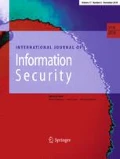Abstract
In this paper we study the randomness complexity needed to distributively perform k XOR computations in a t-private way using constant-round protocols in the case in which the players are honest but curious.
We show that the existence of a particular family of subsets allows the recycling of random bits for constant-round private protocols. More precisely, we show that after a 1-round initialization phase during which random bits are distributed among n players, it is possible to perform each of the k XOR computations using two rounds of communication.
For \(t\leq c\sqrt{n/\log n}\), for any c < 1/2, we design a protocol that uses O(kt 2log n) random bits.
Similar content being viewed by others
References
Bar-Ilan, J., Beaver, D. Non-cryptographic fault-tolerant computing in a constant number of round of interaction. In: Proceedings of 8th ACM Symposium on Principles of Distributed Computing, pp. 36–44 (1989)
Beaver, D., Feigenbaum, J., Kilian, J., Rogaway, P. Security with low communication overhead. In: Advances in Cryptology – CRYPTO 90, pp. 62–76 (1990)
Beaver, D., Micali, S., Rogaway, P. The round complexity of secure protocols. In: Proceedings of 22nd Symposium on Theory of Computing, pp. 503–513 (1990)
Ben-Or, M., Goldwasser, S., Wigderson, A. Completeness theorems for non-cryptographic fault-tolerant distributed computation. In: Proceedings of 20th Symposium on Theory of Computing, pp. 1–10 (1988)
Benaloh J. (1986). Secret sharing homomorphism: Keeping shares of a secret secret. In: Odlyzko A. (eds). Advances in Cryptography – Crypto 86. Lecture Notes in Computer Science, vol. 263, Springer, Berlin Heidelberg New York, pp. 251–260
Blundo, C., Galdi, C., Persiano, P. Randomness recycling in constant round private computations. In: Jayanti, P. (ed.) Proceedings of 13th International Symposium on Distributed Computing (DISC 99), vol. 1693 of LNCS, pp. 138–150 (1999)
Blundo C., Santis A.D., Persiano G., Vaccaro U. (1999) Randomness complexity of private multiparty protocols. Comput. Complex. 8(2): 145–168
Canetti R., Kushilevitz E., Ostrovsky R., Rosén A. (2000) Randomness versus fault-tolerance. J. Cryptol. 13(1): 107–142
Chaum, D., Crepeau, C., Damgärd, I. Multiparty unconditionally secure protocols. In: Proceedings of 20th Symposium on Theory of Computing, pp. 11–19 (1988)
Chor B., Kushilevitz E. (1991) A communication-privacy tradeoff for modular addition. Inf. Process. Lett. 45, 205–210
Chor B., Kushilevitz E. (1991) A zero-one law for boolean privacy. SIAM J. Discrete Mat. 4(1): 36–46
Du D., Hwang F. (1993) Combinatorial Groups Testing and its Applications. World Scientific, Singapore
Erdös P., Frankl P., Füredi Z. (1985) Families of finite sets in which no set is covered by the union of r others. Isr. J. Math. 51: 79–89
Kushilevitz E., Mansour Y. (1997) Randomness in private computations. SIAM J. Discrete Math. 10(4): 647–651
Kushilevitz, E., Ostrovsky, R., Rosèn, A. Characterizing linear size circuit in terms of privacy. In: Proceedings of 28th ACM Symposium on Theory of Computing (1996)
Kushilevitz, E., Ostrovsky, R., Rosèn, A.: Amortizing randomness in private multiparty computations. In: Proceedings of 17th ACM Symposium on Principles of Distributed Computing (1998)
Kushilevitz E., Rosèn A. (1998) A randomness-round tradeoff in private computation. SIAM J. Discerete Math. 11(1): 61–80
Lang, S. Linear Algebra. Addison-Wesley, Reading
Author information
Authors and Affiliations
Corresponding author
Rights and permissions
About this article
Cite this article
Blundo, C., Galdi, C. & Persiano, G. Low-randomness constant-round private XOR computations. Int. J. Inf. Secur. 6, 15–26 (2007). https://doi.org/10.1007/s10207-006-0007-5
Published:
Issue Date:
DOI: https://doi.org/10.1007/s10207-006-0007-5




